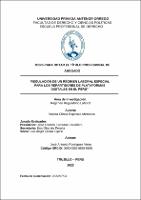Regulación de un regimen laboral especial para los repartidores de plataformas digitales en el Perú

Ver/
Descargar
(application/pdf: 2.227Mb)
(application/pdf: 2.227Mb)
Fecha
2022Autor(es)
Espinoza Mendoza, Violeta Olinda
Metadatos
Mostrar el registro completo del ítemResumen
La Tesis denominada “Regulación de un Régimen Laboral Especial para los Repartidores de
Plataformas Digitales en el Perú”, se orientó a señalar la forma como debe regularse un
régimen laboral especial para los repartidores de plataformas digitales al ser una nueva
modalidad de trabajo que adquirió mucha presencia en el Perú, y que no debe quedar
desprotegida, ya que generaría precarización del empleo.
En este sentido, la formulación del problema de investigación fue el siguiente: ¿De qué
manera la falta de regulación de un régimen laboral especial afecta a los repartidores de
plataformas digitales en el Perú?, frente a lo cual se planteó los siguientes objetivos: I)
Identificar si concurren los elementos esenciales de la relación laboral en los servicios que
prestan los repartidores de plataformas digitales, II) Identificar si existen indicios de
laboralidad suficientes en la labor de los repartidores de plataformas digitales, III) Determinar
la influencia de las tecnologías en las relaciones laborales desde el enfoque de los principios
que sustentan el Derecho del Trabajo y IV) Analizar los avances normativos de la regulación
internacional respecto de los servicios que prestan los repartidores de plataformas digitales.
V) Analizar los derechos laborales que se ven afectados en el caso de los repartidores de
plataformas digitales.
Debido a los diversos métodos de aplicación lógica y jurídica, se infirió, que la mejor forma
de dotar de mayor eficacia y protección al repartidor que presta servicios mediante
plataformas digitales es mediante un régimen laboral especial que contemple derechos
mínimos laborales, tales como: derecho a vacaciones, salario mínimo, protección de riesgos
laborales, etc. Esto debido a que concurren los elementos esenciales del contrato de trabajo y
por ende las plataformas digitales deben asumir la misma responsabilidad que se exige a todas
las demás empresas que coexisten en un Estado Social de Mercado. The thesis called ““Regulation of a Labor Regime for Distributors of Digital Platforms in
Peru““, is aimed at determining how a special labor regime should be regulated for
distributors of digital platforms as it is a new work modality that has been acquiring much
presence in our country and therefore cannot be left unprotected since it would generate
precarious employment.
In this sense, the formulation of our problem was the following: In what way does the
lack of regulation of a labor regime affect the distributors of digital platforms in Peru?,
Against which we set the following objectives: I) Identify if the essential elements of the
employment relationship are present in the services provided by digital platform
distributors, II) Identify whether there are sufficient indications of employment in the
work of digital platform distributors, III) Determine the influence of technologies on
relationships labor from the approach of the principles that sustain the Labor Law and IV)
Analyze the normative advances of the international regulation regarding the services
provided by the distributors of digital platforms.
By virtue of the various methods of logical and legal application, we have managed to
conclude that the best way to provide greater efficiency and protection to the delivery
person who provides services through digital platforms is through a special regime that
includes minimum labor rights: right to vacations, salary minimum, protection of
occupational hazards, etc. This is due to the fact that the essential elements of the
employment contract concur and therefore digital platforms must assume the same
responsibility that is required of all other companies that coexist in a Social Market State.
Colecciones
- Derecho [483]

